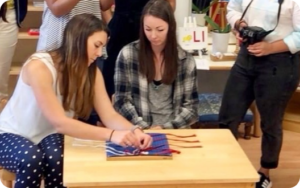A Montessori Teacher Course offers a transformative journey into the principles and practices of Montessori education, equipping educators with the tools and knowledge to nurture young minds effectively. Understanding the curriculum and expectations is important, as it lays the foundation for a successful and enriching experience.
Philosophy of Montessori Education: Understanding Its Importance
Embarking on Montessori Teacher Courses entails more than just learning practical teaching techniques. It’s a holistic journey that begins with understanding the philosophy of Montessori education. This foundational knowledge is a compass, guiding educators toward creating nurturing and empowering learning environments.
Guiding Principles
The philosophy of Montessori education is deeply rooted in principles that shape every aspect of teaching and learning. By grasping these principles, aspiring educators gain clarity on the underlying values that drive Montessori practices, such as respect for the child, fostering independence, and creating a prepared environment conducive to learning.
Alignment with Practice
Learning Montessori’s philosophy provides a solid framework for implementing teaching strategies effectively. It bridges the gap between theory and practice, enabling educators to understand the rationale behind Montessori methods and tailor their approach to meet the diverse needs of learners.
Holistic Approach
Montessori education is renowned for its holistic approach to child development. It focuses on nurturing not just academic skills but also social, emotional, and practical life skills. Understanding the philosophy behind this approach empowers teachers to create learning experiences that foster growth across all domains.
Professional Identity
Delving into the philosophy of Montessori education is an essential step for aspiring Montessori teachers in defining their professional identity. It cultivates a deeper appreciation for the unique values and principles that distinguish Montessori teaching from conventional education, instilling a sense of purpose and passion in their practice.
Child Development: Understanding the Foundations
Understanding child development is paramount for Montessori teachers as it forms the bedrock of their approach toward education. This section of the course emphasizes the importance of grasping developmental theories and patterns, as it enables teachers to tailor their teaching methods to suit the unique needs and stages of each child’s growth. By comprehending the diverse learning styles and family dynamics that influence a child’s development, educators can create nurturing environments conducive to holistic learning and thriving.
Examination of Developmental Theories
At the heart of understanding child development lies a rich tapestry of theories by pioneering psychologists and educators. From Piaget to Vygotsky, Montessori Teacher Academy will delve into various theories, providing educators with a deep understanding of the cognitive, social, emotional, and physical milestones that mark children’s journey toward maturity.
Understanding Developmental Patterns in Young Children
Equipped with knowledge of developmental theories, Montessori teachers gain insight into the unique developmental patterns exhibited by young children. They learn to recognize and appreciate the gradual progression from infancy to childhood, understanding the significance of each stage in shaping a child’s identity and abilities.
Exploration of Different Learning Styles and Family Dynamics
Every child is unique, with their own individual learning style and family background. This part of the curriculum will equip educators with the tools to navigate this diversity, exploring various learning styles and family dynamics. By understanding the interplay between a child’s learning preferences and their familial environment, teachers can effectively tailor their approach to meet each child’s needs.
Classroom Leadership: Cultivating Effective Guidance
In classroom leadership, aspiring educators are equipped with the essential skills for steering the ship of learning toward success. This curriculum segment focuses on instilling strategies for effective classroom leadership, recognizing the pivotal role of environment design, and nurturing positive teacher-student relationships through effective communication tactics.
Strategies for Effective Classroom Leadership
Central to Montessori education is cultivating an environment where children thrive independently while respecting their peers and surroundings. Teachers learn a repertoire of strategies to maintain order, encourage autonomy, and promote collaborative learning experiences within the classroom.
Importance of Environmental Design in Montessori Classrooms
The physical environment plays a crucial role in shaping children’s behavior and fostering their engagement in learning activities. Montessori Teacher Courses emphasize the significance of thoughtful environmental design, where every element is purposefully curated to stimulate curiosity, promote exploration, and cultivate a sense of belonging among students.
Communication Tactics for Fostering Positive Teacher-Student Relationships
Effective communication lies at the heart of building strong teacher-student relationships. Educators learn to communicate with empathy, clarity, and respect, fostering a supportive and nurturing classroom atmosphere where students feel valued, understood, and empowered to reach their full potential. In essence, the Classroom Leadership component of Montessori Teacher Courses is not just about managing a group of students; it’s about guiding, inspiring, and empowering young minds to become independent thinkers, compassionate individuals, and lifelong learners. It’s about creating learning environments that reflect the values of respect, collaboration, and love for learning, laying the foundation for a lifetime of academic and personal success.
Observation and Reflection: Cultivating Insightful Teaching Practices
Observation and reflection form the cornerstone of effective Montessori teaching. They enable educators to gain invaluable insights into students’ learning processes and refine their teaching approaches accordingly.
Framework for Observation in Montessori Classrooms
Educators are introduced to a systematic framework for observation, emphasizing the importance of keen observation skills in understanding students’ individual needs, interests, and learning styles. Through intentional observation, teachers understand how children engage with Montessori materials, interact with their peers, and navigate their learning journey.
Reflective Practices to Connect Theory to Practice
Reflective practice lies at the heart of professional growth and development for Montessori teachers. This course component guides educators in reflecting critically on their teaching practices, classroom dynamics, and student outcomes, fostering a continuous cycle of improvement. By bridging the gap between theory and practice through reflective inquiry, teachers can refine their instructional strategies, address challenges, and optimize learning experiences for their students.
Utilizing Observation for Continuous Improvement in Teaching
Observation is a powerful tool for teachers to continuously assess and adapt their instructional methods to meet the evolving needs of their students. Montessori Teacher Courses empower educators to leverage observation data to inform instructional decision-making, identify areas for growth, and implement targeted interventions that support student learning and development.
Cultural Studies: Nurturing Global Awareness and Inclusivity
Cultural Studies serve as a gateway to broadening children’s horizons and fostering a deep appreciation for diversity, equity, and inclusion. This section encapsulates the integration of cultural subjects into the curriculum, emphasizing the importance of Anti-Bias and Anti-Racist Education in cultivating a more equitable society.
Expanding Children’s Awareness of the World
Montessori education strongly emphasizes nurturing global citizens who possess a deep understanding and respect for diverse cultures, traditions, and perspectives. The Cultural Studies curriculum exposes children to a rich tapestry of global heritage, geography, customs, and languages, fostering curiosity and empathy toward the world beyond their immediate surroundings.
Integration of Cultural Subjects into the Curriculum
Through thoughtfully curated lessons and materials, Montessori educators seamlessly weave cultural studies into various facets of the curriculum, including language, geography, history, and the arts. By immersing children in multicultural experiences and celebrations, educators create inclusive learning environments that celebrate the richness of human diversity and promote intercultural understanding.
Emphasis on Anti-Bias and Anti-Racist Education
In alignment with Montessori principles of social justice and equity, Montessori Teacher Courses underscore the importance of Anti-Bias and Anti-Racist Education in addressing systemic inequalities and fostering a culture of inclusivity. Educators are equipped with strategies to recognize and challenge bias, cultivate empathy and respect for all individuals, and empower children to become agents of positive social change in their communities.
It’s essential to reflect on the diverse and enriching curriculum covered throughout the training program, recognizing that this is just one facet of the broader Montessori teacher training landscape. Different courses may offer variations in curriculum, but each contributes to the comprehensive preparation of aspiring Montessori educators.
If you’re inspired by the transformative potential of Montessori education and eager to embark on a rewarding journey as a Montessori teacher, we invite you to enroll in the Montessori Teacher Academy. Explore the Academic Year Component and immerse yourself in a comprehensive training experience designed to empower you as an educator, nurturer, and guide to young learners. Discover the boundless possibilities of Montessori teaching and join us in shaping the future of education.



